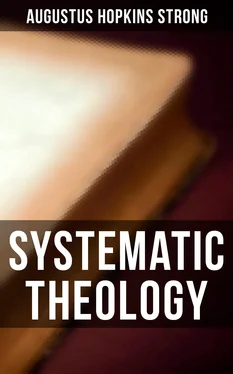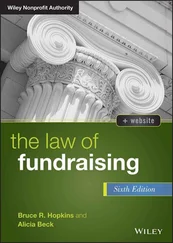(b) The same argument that proves God unknowable proves the universe unknowable also. Since every particle of matter in the universe attracts every other, no one particle can be exhaustively explained without taking account of all the rest. Thomas Carlyle: “It is a mathematical fact that the casting of this pebble from my hand alters the centre of gravity of the universe.” Tennyson, Higher Pantheism: “Flower in the crannied wall, I pluck you out of the crannies; Hold you here, root and all, in my hand, Little flower; but if I could understand What you are, root and all, and all in all, I should know what God and man is.” Schurman, Agnosticism, 119—“Partial as it is, this vision of the divine transfigures the life of man on earth.” Pfleiderer, Philos. Religion, 1:167—“A faint-hearted agnosticism is worse than the arrogant and titanic gnosticism against which it protests.”
E. Because all predicates of God are negative, and therefore furnish no real knowledge. We answer: (a) Predicates derived from our consciousness, such as spirit, love, and holiness, are positive. (b) The terms “infinite” and “absolute,” moreover, express not merely a negative but a positive idea—the idea, in the former case, of the absence of all limit, the idea that the object thus described goes on and on forever; the idea, in the latter case, of entire self-sufficiency. Since predicates of God, therefore, are not merely negative, the argument mentioned above furnishes no valid reason why we may not know him.
Versus Sir William Hamilton, Metaphysics, 530—“The absolute and the infinite can each only be conceived as a negation of the thinkable; in other words, of the absolute and infinite we have no conception at all.” Hamilton here confounds the infinite, or the absence of all limits, with the indefinite, or the absence of all known limits. Per contra, see Calderwood, Moral Philosophy, 248, and Philosophy of the Infinite, 272—“Negation of one thing is possible only by affirmation of another.” Porter, Human Intellect, 652—“If the Sandwich Islanders, for lack of name, had called the ox a not-hog , the use of a negative appellation would not necessarily authorize the inference of a want of definite conceptions or positive knowledge.” So with the infinite or not-finite, the unconditioned or not-conditioned, the independent or not-dependent—these names do not imply that we cannot conceive and know it as something positive. Spencer, First Principles, 92—“Our consciousness of the Absolute, indefinite though it is, is positive, and not negative.”
Schurman, Agnosticism, 100, speaks of “the farce of nescience playing at omniscience in setting the bounds of science.” “The agnostic,” he says, “sets up the invisible picture of a Grand Être, formless and colorless in itself, absolutely separated from man and from the world—blank within and void without—its very existence indistinguishable from its non-existence, and, bowing down before this idolatrous creation, he pours out his soul in lamentations over the incognizableness of such a mysterious and awful non-entity. … The truth is that the agnostic's abstraction of a Deity is unknown, only because it is unreal.” See McCosh, Intuitions, 194, note; Mivart, Lessons from Nature, 363. God is not necessarily infinite in every respect. He is infinite only in every excellence. A plane which is unlimited in the one respect of length may be limited in another respect, such as breadth. Our doctrine here is not therefore inconsistent with what immediately follows.
F. Because to know is to limit or define. Hence the Absolute as unlimited, and the Infinite as undefined, cannot be known. We answer: (a) God is absolute, not as existing in no relation, but as existing in no necessary relation; and (b) God is infinite, not as excluding all coexistence of the finite with himself, but as being the ground of the finite, and so unfettered by it. (c) God is actually limited by the unchangeableness of his own attributes and personal distinctions, as well as by his self-chosen relations to the universe he has created and to humanity in the person of Christ. God is therefore limited and defined in such a sense as to render knowledge of him possible.
Versus Mansel, Limitations of Religious Thought, 75–84, 93–95; cf. Spinoza: “Omnis determinatio est negatio;” hence to define God is to deny him. But we reply that perfection is inseparable from limitation. Man can be other than he is: not so God, at least internally. But this limitation, inherent in his unchangeable attributes and personal distinctions, is God's perfection. Externally, all limitations upon God are self-limitations, and so are consistent with his perfection. That God should not be able thus to limit himself in creation and redemption would render all self-sacrifice in him impossible, and so would subject him to the greatest of limitations. We may say therefore that God's 1. Perfection involves his limitation to (a) personality, (b) trinity, (c) righteousness; 2. Revelation involves his self-limitation in (a) decree, (b) creation, (c) preservation, (d) government, (e) education of the world; 3. Redemption involves his infinite self-limitation in the (a) person and (b) work of Jesus Christ; see A. H. Strong, Christ in Creation, 87–101, and in Bap. Quar. Rev., Jan. 1891:521–532.
Bowne, Philos. of Theism, 135—“The infinite is not the quantitative all; the absolute is not the unrelated. … Both absolute and infinite mean only the independent ground of things.” Julius Müller, Doct. Sin, Introduc., 10—“Religion has to do, not with an Object that must let itself be known because its very existence is contingent upon its being known, but with the Object in relation to whom we are truly subject, dependent upon him, and waiting until he manifest himself.” James Martineau, Study of Religion, 1:346—“We must not confound the infinite with the total . … The self-abnegation of infinity is but a form of self-assertion, and the only form in which it can reveal itself. … However instantaneous the omniscient thought, however sure the almighty power, the execution has to be distributed in time, and must have an order of successive steps; on no other terms can the eternal become temporal, and the infinite articulately speak in the finite.”
Perfect personality excludes, not self -determination, but determination from without , determination by another . God's self-limitations are the self-limitations of love, and therefore the evidences of his perfection. They are signs, not of weakness but of power. God has limited himself to the method of evolution, gradually unfolding himself in nature and in history. The government of sinners by a holy God involves constant self-repression. The education of the race is a long process of divine forbearance; Herder: “The limitations of the pupil are limitations of the teacher also.” In inspiration, God limits himself by the human element through which he works. Above all, in the person and work of Christ, we have infinite self-limitation: Infinity narrows itself down to a point in the incarnation, and holiness endures the agonies of the Cross. God's promises are also self-limitations. Thus both nature and grace are self-imposed restrictions upon God, and these self-limitations are the means by which he reveals himself. See Pfleiderer, Die Religion, 1:189, 195; Porter, Human Intellect, 653; Murphy, Scientific Bases, 130; Calderwood, Philos. Infinite, 168; McCosh, Intuitions, 186; Hickok, Rational Cosmology, 85; Martineau, Study of Religion, 2:85, 86, 362; Shedd, Dogmatic Theology, 1:189–191.
G. Because all knowledge is relative to the knowing agent; that is, what we know, we know, not as it is objectively, but only as it is related to our own senses and faculties. In reply: (a) We grant that we can know only that which has relation to our faculties. But this is simply to say that we know only that which we come into mental contact with, that is, we know only what we know. But, (b) We deny that what we come into mental contact with is known by us as other than it is. So far as it is known at all, it is known as it is. In other words, the laws of our knowing are not merely arbitrary and regulative, but correspond to the nature of things. We conclude that, in theology, we are equally warranted in assuming that the laws of our thought are laws of God's thought, and that the results of normally conducted thinking with regard to God correspond to the objective reality.
Читать дальше












